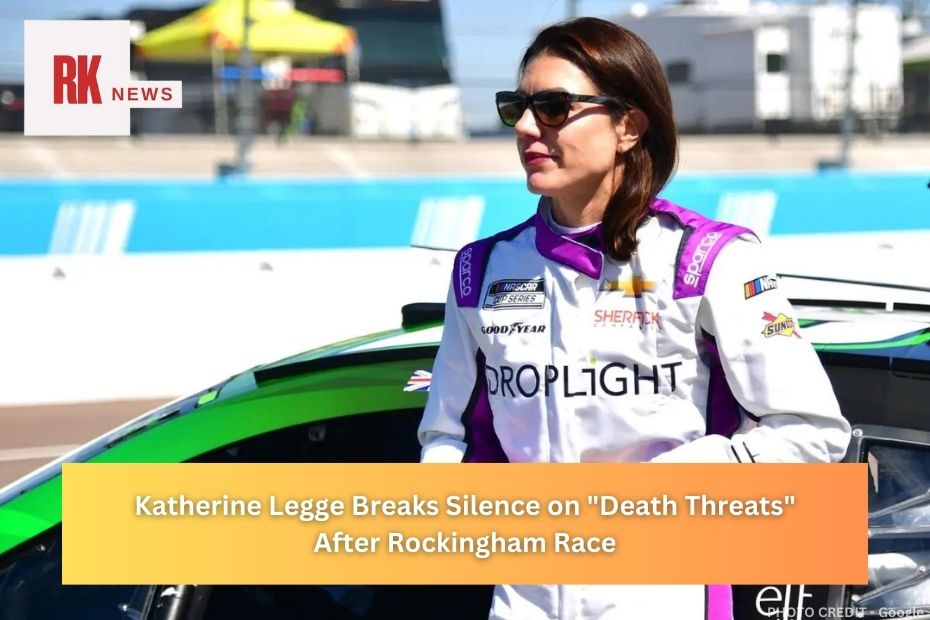A Tense Return to the Xfinity Series
Last week at Rockingham Speedway, British racing driver Katherine Legge made her first of six planned starts in the NASCAR Xfinity Series for the 2025 season. After a controversial performance in the Phoenix Cup race earlier this year, Legge was determined to redeem herself. However, her return didn’t go as planned. In her sixth career Xfinity start, she was involved in a frustrating sequence of events—starting with a contentious qualifying session and culminating in a wreck involving Kasey Kahane while she was already a lapped car.
Backlash from Fans Turns Toxic
The incident sparked outrage among some NASCAR fans, and unfortunately, some individuals crossed the line into harassment. What began as criticism of her on-track performance quickly devolved into vile personal attacks, including death threats and inappropriate se**al insults.
These disturbing experiences were discussed on the “Throttle Therapy” podcast, where Legge openly addressed the level of abuse she’s received online. As a seasoned racer and public figure, she’s no stranger to criticism—but this time, it hit a different level.
Standing Firm Against Harassment
Legge didn’t hold back. She made it clear that harassment and threats have no place in the racing world—or any professional environment. She warned those she described as “supposed NASCAR fans” that she refuses to let these abusive messages compromise her dignity or her safety.
“Whatever the motivation behind it, a real NASCAR fan should never harass a competitor,” Legge stated. “They should value the effort every athlete puts in.”
Her strong words served as a reminder that while criticism can be part of the sport, threats and personal attacks are entirely unacceptable.
Welcoming Constructive Criticism
Legge emphasized that she is always open to constructive criticism. In fact, she respects and appreciates fans who genuinely want to help her improve. Suggestions aimed at helping her become a better driver or take responsibility for on-track mistakes are welcome.
“Criticism, when it comes from a place of passion and respect, is something I can work with,” she shared.
Advertisement
This kind of support, she explained, helps her grow—not just as a driver, but also as a competitor who can self-reflect and learn from missteps.
A Disappointing Reality for Female Racers
Unfortunately, Legge pointed out that female drivers in motorsport face disproportionately high levels of abuse. She believes that some of the backlash comes from fans who still struggle with the presence of women in a historically male-dominated sport.
“Some people just can’t accept change,” Legge explained. “Racing is still a male-dominated space, and that makes women easy targets for hate.”
She warned that ignoring such abuse or treating it as normal will only make the racing environment more toxic for future competitors.
Drawing a Clear Line Between Feedback and Abuse
On the podcast, Legge discussed how thin the line is between legitimate criticism and personal attacks. When that line is crossed too often, it doesn’t just damage the reputation or feelings of a driver—it can create long-term mental and emotional harm.
She expressed frustration that such behavior continues to be tolerated by segments of the racing fanbase.
“When this keeps happening to women in the sport, it’s not just discouraging—it’s dangerous,” she said.
Looking Forward to a Stronger Season
Despite the recent negativity, Legge remains focused on her Xfinity campaign. With five more starts left in the season, fans and analysts alike are eager to see how she’ll respond on the track.
Her resolve and professionalism in the face of adversity show that she is not only a capable racer but also a resilient role model in the sport.
Conclusion
Katherine Legge’s experience at Rockingham serves as both a cautionary tale and a call to action. While criticism is part of the game, there must be a zero-tolerance policy for harassment, especially in an era where diversity and inclusivity in sports are gaining traction. Legge’s grace under pressure and bold confrontation of hate is a powerful message—both to her critics and to the next generation of racers watching her fight back with strength and integrity.
